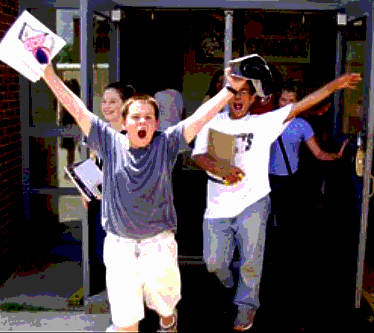Our son, Tanner does virtual school from home and has all his school life. We chose virtual school over homeschool because it was much less dependent on us and still allowed him to have a teacher experience, field trips and provided all books and other materials needed. It is still within the public school system, but gives much more flexibility among many other benefits.
Our daughter, Olivia came home from public school halfway through 9th grade after having many issues with teachers and the school in general. She as able to do virtual school very successfully and improved her self esteem greatly. In fact, she graduated from virtual school.
But the biggest thing we heard over and over was “What about the socialization?!” As if the only way a child could ever see another child was in a school setting. It has been something we’ve seen first hand as unfounded.
The following was written in December of 1999 by Manfred B. Zysk and still holds true:
One of the silliest and most annoying comments made to homeschooling parents is, “Aren’t you concerned about how your child will be able to socialize with others?”. What is being implied here is that the homeschooled child is some kind of introverted misfit who cannot relate to other people, children, and the outside world. In reality, most of the homeschooled children that I have known and met are not only outgoing, but polite and respectful, too. This is a sharp contrast to the public school children that I have known, who can’t relate to adults and whose behavior is rude and inconsiderate. Realistically, there are some exceptions on both sides.
Isn’t it interesting that amid all of the public school shootings over the past few years, the only comment that opponents of homeschooling can come up with is the red herring of “socialization”? You may have noticed, there haven’t been shootings at private schools, or shootings inside of the homes of homeschooled children.
Opponents of homeschooling can’t complain about average test scores, since homeschooled children consistently outscore public school children, so they instead make a problem that doesn’t exist.
Who is responsible for creating this “socialization” problem? This myth has been perpetrated by sociologists, psychologists, public school administrators, the NEA (and local teacher’s unions), etc., whenever they comment on homeschooling to the news media. These are the same people who give Ritalin (a very strong narcotic) and other drugs to schoolchildren, in place of discipline.
A family member asked my wife, “Aren’t you concerned about his (our son’s) socialization with other kids?”. My wife gave this response: “Go to your local middle school, junior high, or high school, walk down the hallways, and tell me which behavior you see that you think our son should emulate.” Good answer.
In order for children to become assimilated into society properly, it is important to have a variety of experiences and be exposed to differing opinions and views. This enables them to think for themselves and form their own opinions. This is exactly what public education does not want; public education is for the lowest common denominator and influencing all of the students to share the same views (“group-think”) and thought-control through various means, including peer-pressure.
Homeschooling allows parents the freedom to associate with other interested parties, visit local businesses, museums, libraries, etc. as part of school, and to interact with people of all ages in the community. For example, my son goes on field trips with other homeschooling families in our community. He recently was able to visit an audiologist, a McDonald’s restaurant (to see how they run their operation), and several other similar activities. He gets to meet and talk to people of different ages doing interesting (and sometimes not so interesting) occupations. He spends a lot of his free time with kids older and younger than himself, and adults from twenty to over ninety years old.
Meanwhile, in public school, children are segregated by age, and have very little interaction with other adults, except their teacher(s). This environment only promotes alienation from different age groups, especially adults. This is beginning to look like the real socialization problem.
My wife and I like to bring our son with us when we are visiting with friends and other adults. How else will he learn to be an adult, if he never has contact with adults? He knows what kind of behavior we expect from him, and the consequences of his actions. He is often complimented on his good manners by friends and adults.
In conclusion, homeschooling parents choose to homeschool for a variety of reasons, but I have never heard any homeschooling parent say that the reason they want to homeschool is to isolate their child from all of society. But, it probably wouldn’t be a bad idea for homeschooled children to stay away from public school administrators, the NEA members, sociologists, and others who cannot properly “socialize” with children.
Go to your local public school, walk down the hallways and see what behaviors you would want your child to emulate.
Our kids get to attend events for our business with us and the travel has done them a world of good. Honestly, they are some of the most socialized kids I know. There are a lot of things I’m very happy they did not have to be subjected to in a regular school setting. We are so happy with our decision. It has allowed us to be the primary influence in their lives.







Home schooling is something my husband and I have considered for our almost 3-year-old. The virtual school seems more a fit for my personality. I agree that there are lots of ways to socialize a child than just sending them to school!
Nikole – I’d be glad to share our experience if it helps. We love it!
EXACTLY! Sorry to shout, but on occasion it is necessary and this is one of those. 😉
I homeschooled my children as well and got this question more times than I care to count.
And I’m sure they are very well adjusted kids, Alicia! It’s such a knee-jerk response. It’s really interesting that it’s such an “in the box” and typical thing for most people to say.
Great post, I totally agree with any one who doesn’t put their child through the public school system. It’s outdated and was developed for an industrial age, now it’s just about testing and statistics the kids don’t even matter.
It’s very sad, but it sounds like Tanner’s gonna crush it when he grows up. Thanks for sharing the insight and makes my choices more clear when I finally have kids.
Cheers!
Thanks, Hank. Totally agree. And yes – Tanner is going to crush it! I’m going to write a whole series like this along w/our experiences. 🙂
Props to the Knechts! After reading this article, I’ve concluded that because you both made the powerful decision for Tanner to do virtual school, you are simultaneously teaching him to recognize when he has made a good decision! It sounds like this was a great decision for you and your family!
Thanks, Carrie. Yes, he’s learning all sorts of stuff being home with us that he wouldn’t at a regular school. And conversely, NOT learning things by default that we don’t want him to from kids we don’t know/approve of.
Amen, Melissa! We have two children in virtual school – one in Kindergarten and the other in 3rd grade. Our kindergartner has severe vision challenges, so virtual school was a no-brainer. It has allowed us to be an integral part of his learning process. And he is thriving because of the personalized learning environment that we are able to provide him through virtual school. He’s learned more in the past few months than he learned in two years in a private preschool.
Our 3rd grader is in her second year of virtual school, and is also thriving. She is able to participate in several Gifted & Talented courses, which was not even an option in our public school system. And she is one of the most socialized kids I know. Everyone who meets her, adores her. 🙂
Thanks so much for sharing this post. People deserve to know that they do have a choice that is a very happy medium between public school, and full-blown homeschooling.
I’ve met your kids, Darcy, so I know how well they’re doing. We have kids and then many parents either don’t know another way exists (as it was for our first two before we did research for Tanner) or have to use school as day care. But these kids are our gifts in this life and we owe them something so much better.
All 4 of my kids where/are homeschooled. Was one of the best decisions I ever made. They are all now very well adjusted adults pursuing their dreams. We are more of an unschooling family. Virtual school was not around when my older kids where still in school and my younger ones prefer actual books and like to study what they want, when they want. And the 2 youngest have dyslexia, so we have had to use unique ways to learn things at times. The one year my youngest went to school for 9th grade (her decision), the school refused to work with her dyslexia issues. And since the 2 younger ones have either been involved in gymnastics or ballet 6-7 hrs a day sine they where 8 and 9 yrs old, homeschooling was the most logical choice anyway.
That’s awesome Becqui! Up until high school, Tanner had books as well. Now most everything is online except for the novels and other books he reads for English. So glad you found what worked for your family!